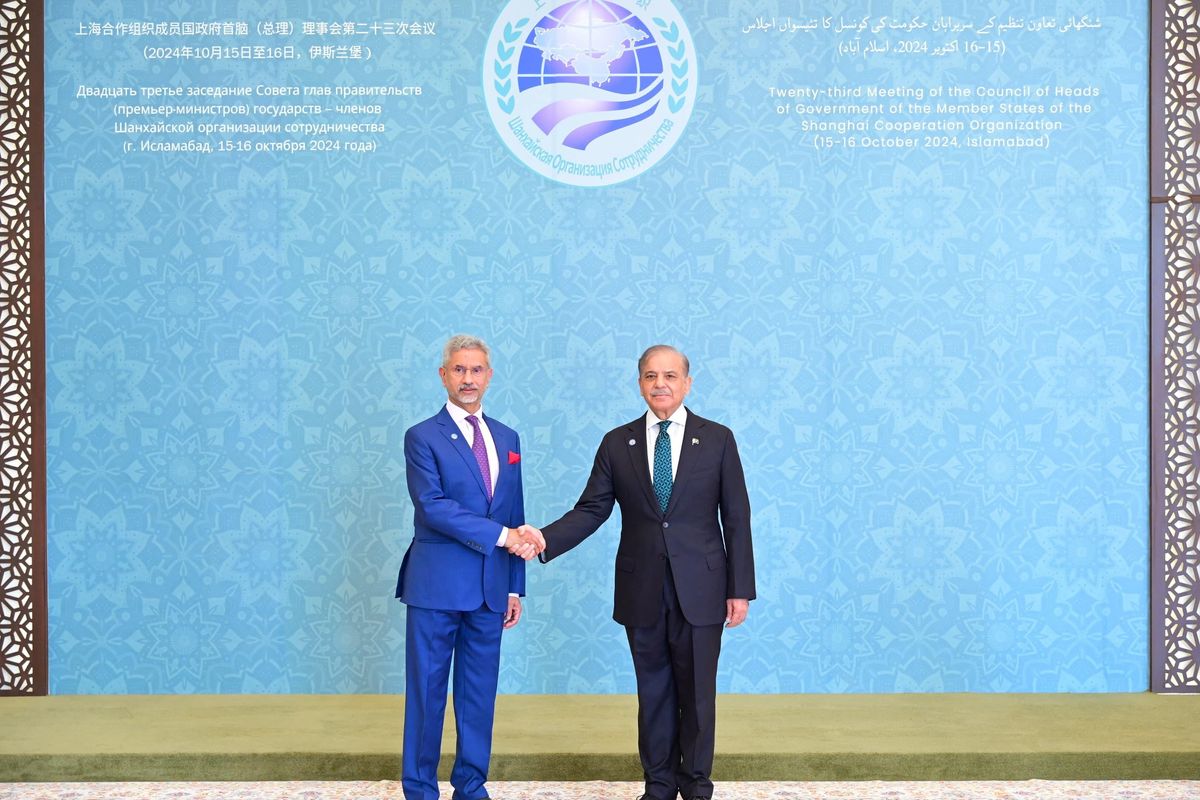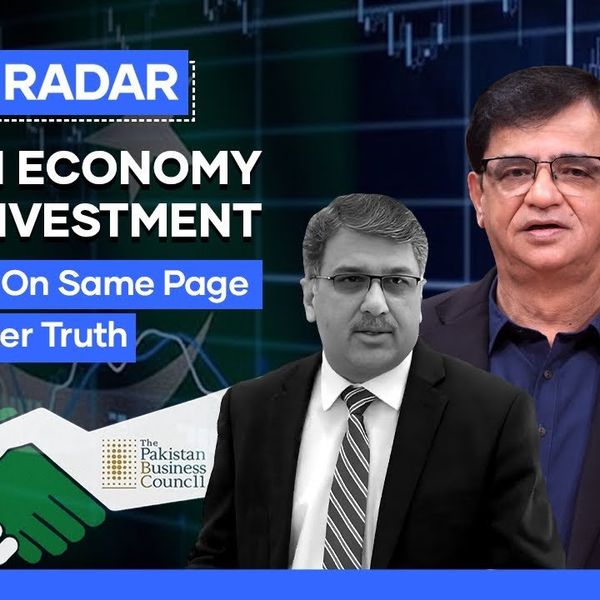SCO summit in Islamabad sparks hope for thaw in Pakistan-India relations
Indian FM thanked PM Shehbaz Sharif, DPM Ishaq Dar and Pakistani govt for hospitality and courtesies

Aamir Abbasi
Editor, Islamabad
Aamir; a journalist with 15 years of experience, working in Newspaper, TV and Digital Media. Worked in Field, covered Big Legal Constitutional and Political Events in Pakistan since 2009 with Pakistan’s Top Media Organizations. Graduate of Quaid I Azam University Islamabad.

Asma Kundi
Producer, Islamabad
Asma Kundi is a multimedia broadcast journalist with an experience of almost 15 years. Served national and international media industry as reporter, producer and news editor.

Prime Minister Muhammad Shehbaz Sharif receives the Indian Foreign Minister Subrahmanyam Jaishankar, at the venue of the 23rd Shanghai Cooperation Organisation (SCO) on the Council of Heads of Government Meeting in Islamabad, Pakistan October 16, 2024.
Reuters
The overall atmosphere was notably cordial, with positive gestures from both sides
Experts however believe visit significant, but unlikely to signal a thaw in icy relations between the two countries
The 23rd Shanghai Cooperation Organisation (SCO) Heads of Government Council Meeting concluded in Pakistan on Wednesday, offering a rare diplomatic moment between Pakistan and India amid years of stagnant relations.
This visit marks the first by an Indian foreign minister to Pakistan in nearly a decade, sparking widespread media interest.
Both nations have kept their high commissioners withdrawn since 2019, following India's revocation of Article 370 from its Constitution, which ended Jammu and Kashmir's special status.
In response, Pakistan downgraded its diplomatic ties and expelled India's high commissioner. India also withdrew its high commissioner from Pakistan, leading to a diplomatic stalemate that has persisted since then.
Cordial atmosphere
Indian Foreign Minister Dr Subrahmanyam Jaishankar attended the summit but stressed the visit was for multilateral discussions under the SCO umbrella, not bilateral talks with Pakistan.
His body language and actions, however, drew media attention, with his posts on X (formerly Twitter) projecting a sense of goodwill. These posts, including one where Jaishankar planted a tree at the Indian High Commission, resonated positively. In another post, he was shown taking a morning walk.
An Arjuna sapling at @IndiainPakistan premises is another commitment to #Plant4Mother. #एक_पेड़_माँ_के_नाम pic.twitter.com/3Xx6prcmFm
— Dr. S. Jaishankar (@DrSJaishankar) October 16, 2024
Despite the Indian minister's firm stance on avoiding bilateral discussions, the overall atmosphere was notably cordial, a marked contrast to previous confrontations between Indian and Pakistani officials.
In another tweet, Jaishankar thanked Pakistani Prime Minister Shehbaz Sharif, Foreign Minister and Deputy Prime Minister Ishaq Dar, and the government of Pakistan for the hospitality and courtesies.
Departing from Islamabad. Thank PM @CMShehbaz, DPM & FM @MIshaqDar50 and the Government of Pakistan for the hospitality and courtesies. pic.twitter.com/wftT91yrKj
— Dr. S. Jaishankar (@DrSJaishankar) October 16, 2024
Statements from both sides
Although the Indian FM and PM Shehbaz didn’t mention each other directly, their speeches at the SCO session were positive about regional cooperation and good neighborliness as per the SCO charter.
Jaishankar emphasized the importance of mutual trust, good neighborliness, and regional cooperation in line with the SCO Charter. Without naming Pakistan directly, he highlighted concerns about cross-border terrorism, extremism, and separatism, calling for an end to activities that hinder regional trade, connectivity, and stability.
Jaishankar stressed the need for cooperation based on respect for territorial integrity and sovereignty while urging member states to avoid unilateral agendas. His remarks reflected India’s broader concerns regarding regional security and its relations with Pakistan.
On the other hand, PM Shehbaz, in his address, focused on fostering regional collaboration, economic development, and infrastructure projects.
Prime Minister Muhammad Shehbaz Sharif signing the outcome documents at the conclusion of the 23rd Meeting of SCO Heads of Government at Jinnah Convention Centre on 16 October 2024.#SCOinPakistan #SCO2024 pic.twitter.com/CdcmpPt1lI
— PTV News (@PTVNewsOfficial) October 16, 2024
While avoiding direct references to any country, Shehbaz emphasized the importance of a stable Afghanistan for regional trade and connectivity, a point of shared interest for regional security.
Additionally, giving a positive message of cooperation for all member states, the Pakistani premier advocated for collaborative economic policies and reformed financial systems, urging SCO members to work together to counter global challenges.
Positive step
Devi Rupa Mitra, Editor at the digital media platform The Wire, told Nukta that while the Indian foreign minister’s visit is significant as it marks the first high-level visit by an Indian official to Pakistan in years, it’s important to remember that the primary focus of the visit is the SCO summit, not bilateral talks.
She added that India's participation in the summit is a positive step, and both sides displayed maturity in their public statements, reflecting a more measured approach in their diplomatic engagement.
Abhishek, an independent Indian journalist, remarked that the in-person participation of the Indian foreign minister was a positive development, noting that he could have opted for virtual attendance.
He emphasized that the body language from both sides was notably cordial, with no signs of a cold shoulder. Additionally, the Pakistani prime minister extended a warm reception, demonstrating good hospitality during their interactions.
This overall atmosphere suggests a constructive shift in tone between the two nations, he added.
Ashish Kumar Singh from ABP News India, highlighted that the statements from both sides were encouraging, as neither targeted the other, which in itself suggests that something might be happening behind the scenes.
He recalled the last summit in Goa, where tensions flared with sharp exchanges between Pakistani Foreign Minister Bilawal Bhutto-Zardari and his Indian counterpart. In contrast, this time the restraint shown by both sides could indicate potential progress in their diplomatic relations.
‘Thaw unlikely’
Dr Qamar Cheema, Executive Director of the Sanober Institute, which focuses on policy reforms, shared his views with Nukta regarding the Indian FM's visit to Pakistan.
While significant, the visit is multilateral in nature, and not intended for bilateral talks. This was made clear by Jaishankar during a press conference prior to the visit.
According to Dr Cheema, India is obligated to attend this important event, as leaving their seat vacant would project a negative image of the Indian government on the international stage.
وزیرِاعظم محمد شہباز شریف کا شنگھائی تعاون تنظیم کے سربراہانِ حکومت کی کونسل کے 23 ویں اجلاس سے خطاب
شنگھائی تعاون تنظیم (ایس سی او) کی طاقت اس کی سیاسی اور اقتصادی جہتوں اور بھرپور ثقافتی تنوع میں ہے۔ ایس سی او کے خصوصی ورکنگ گروپ کے مستقل چیئر کے طور پر غربت سے نمٹنے کے لیے… pic.twitter.com/ZYUmM3CSMn
— Government of Pakistan (@GovtofPakistan) October 16, 2024
However, he expressed skepticism that this visit signals any thaw in the icy relations between the two countries. He pointed out that Jaishankar's stance of avoiding engagement with Pakistan reflects India's deeper societal and political investments in maintaining this distance.
He added that India has missed a potential opportunity to move forward with Pakistan, but initiating such dialogue is particularly difficult given the domestic narratives India has built around disengagement.
Moreover, with state elections looming in India, Dr Cheema believes the Indian government is unlikely to take any risks by engaging with Pakistan at this time.
On the other hand, he added, Pakistan is grappling with numerous internal challenges, including security and financial issues, making it an inopportune moment for India to take the initiative toward dialogue.
As for backdoor diplomacy, Dr Cheema acknowledged that both sides are indeed engaged in track two diplomacy on various issues. These discussions often take place through one-on-one meetings with third-party support. However, as far as direct talks are concerned, he concluded that we will need to wait and see.










Comments
See what people are discussing